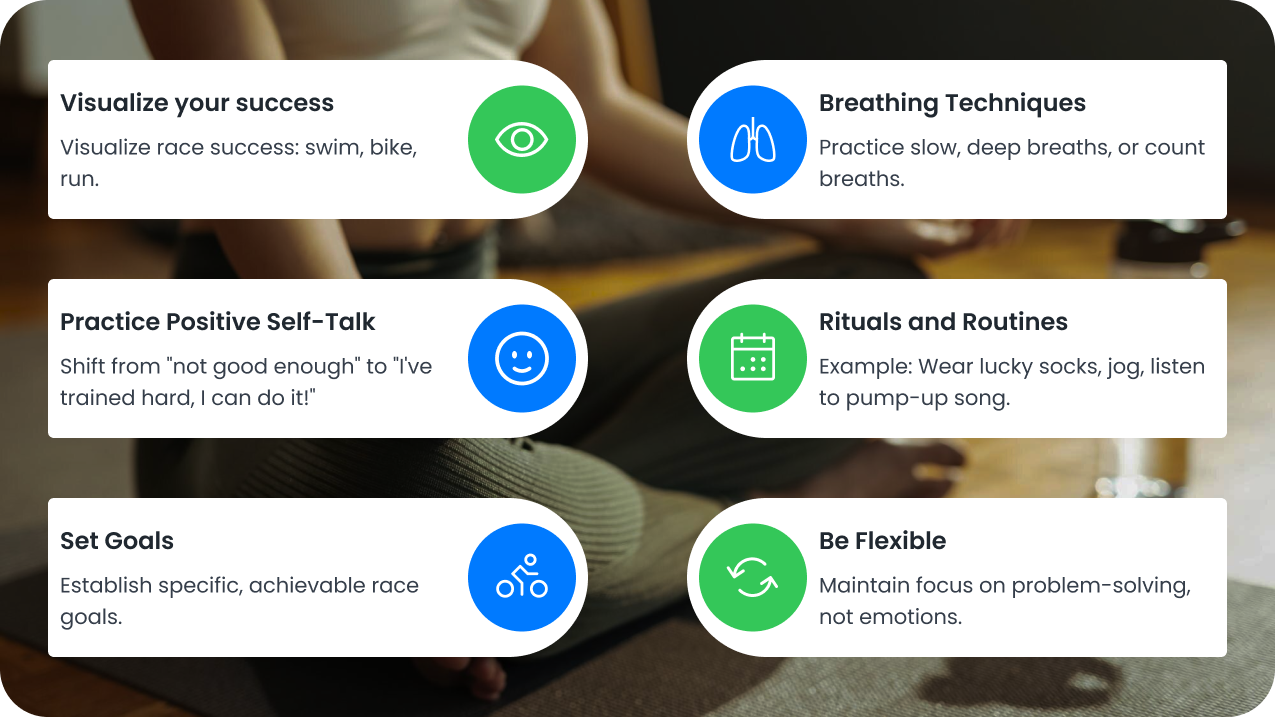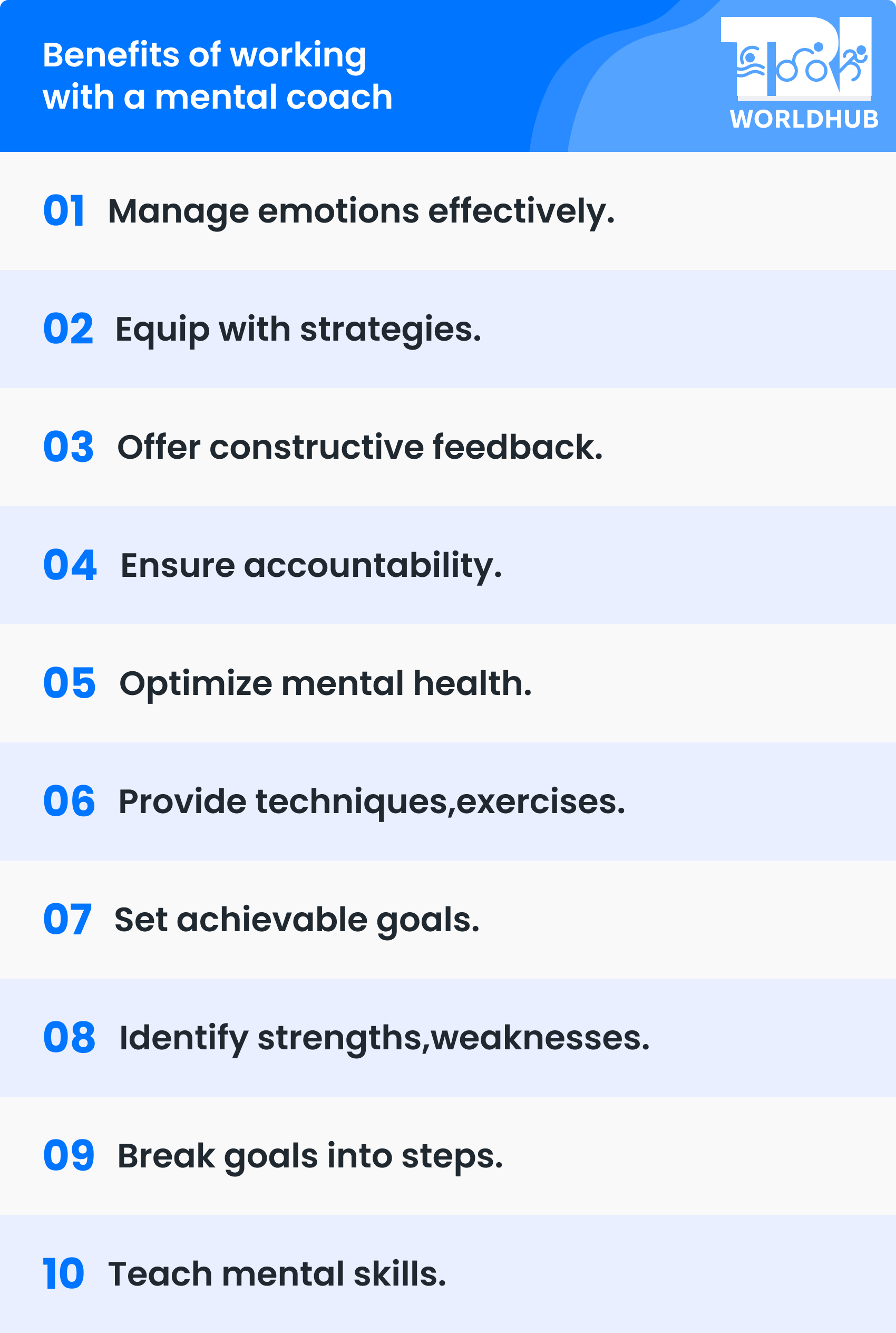Hey there, athletes gearing up for that big triathlon race! Ever felt those pre-race jitters?
We’ve got your back.
In this guide, we’re diving into the game-changing power of mental prep.
Picture this: you’re at the starting line, heart pounding, but instead of nerves, you’re filled with rock-solid confidence.
How? By mastering your mental game. Get ready to uncover practical tips and techniques to reduce anxiety and crush your race with focus and determination.
Let’s dive in!
6 Winning Ways Athletes Mentally Prepare For Competition
Mental preparation is crucial for athletes gearing up for a triathlon race.
Here are some tips and strategies that athletes often employ to get mentally ready for competition:

1. Visualize Your Success
Picture yourself successfully completing each part of the race in your mind. Imagine swimming smoothly, biking steadily, and running strong to the finish line.
You can practice closing your eyes and visualizing yourself swimming in the open water, feeling confident and strong as you navigate through the waves.
2. Practice Positive Self-Talk
Instead of thinking negatively, and feeding your anxiety wolf, try to talk to yourself positively. Remind yourself of your training and believe in your abilities.
Instead of saying, “I’m not good enough,” say to yourself, “I’ve trained hard for this, and I can do it!”
3. Set Goals
Set clear goals for what you want to achieve in the race.
Focus on making them specific and achievable, like finishing within a certain time or focusing on maintaining a steady pace.
Your goal could be to finish the race in under two hours or to run the last mile without stopping.
4. Incorporate Breathing Techniques
Use special breathing exercises to help your body relax and stay calm.
Techniques like taking slow, deep breaths or counting your breaths can help reduce stress.
Try to take a deep breath in for four counts, hold it for four counts, and then slowly exhale for four counts to calm your nerves before the race starts.
5. Build Rituals and Routines
Create rituals or routines to follow before the race begins.
These can be things like warming up in a specific way, listening to your favorite song, or doing a set of stretches. Just simple actions your brain got used to.
Wear your lucky socks, do a short jog to warm up your muscles, and then listen to your favorite pump-up song before heading to the starting line.
6. Be Flexible
Be ready to adjust your plans if things don’t go as expected during the race.
Stay flexible and focused on finding solutions to any challenges that come your way instead of being too emotional over things you can’t control.
For example, if the weather suddenly changes, be prepared to adjust your strategy, like wearing extra layers or adjusting your pace to account for wind or rain.
Learning to control your thoughts and feelings can keep you calm and focused when things get tough.
Stay Present
Practice mindfulness to stay focused on what’s happening right now and avoid getting sidetracked by worrying about the past or future.
Get Help if Needed
You can try working with a coach who can provide personalized support and guidance. Just like when choosing a triathlon training coach, ask for their certifications, coaching practices, and successful cases.
A coach can give you specific techniques tailored to your strengths and weaknesses. Let’s explore the benefits of working with a mental performance coach.

How Mental Performance Coaching Can Help
Mental performance coaching can be a game-changer for athletes looking to enhance their mental skills and achieve peak performance.
Here’s how mental performance coaching can help:
- A mental performance coach works closely with you to identify your unique strengths, weaknesses, and mental barriers.
- Coaches help to set clear, achievable goals and create action plans to reach them.
- They assist in breaking down long-term goals into smaller, manageable steps, ensuring you stay focused and motivated throughout your journey.
- Mental performance coaches teach valuable mental skills such as resilience, focus, confidence, and self-awareness. They provide techniques and exercises to cultivate a positive mindset, manage feelings and emotions effectively, and overcome performance anxieties.
- During high-pressure situations or setbacks, mental performance coaches equip you with strategies to maintain composure, adapt to challenges, and bounce back stronger.
- Coaches offer constructive feedback and accountability to ensure you stay on track with your mental training.
- Mental performance coaching often extends beyond sports performance to encompass overall well-being.
- Coaches address factors such as sleep, nutrition, recovery, and work-life balance to optimize athletes’ mental and physical health.
Mental performance coaching gives athletes the tools and support to reach their full potential, overcome mental barriers, and succeed in sports and life.
It encourages learning, resilience, and self-improvement, helping athletes thrive in what they do.
A session with a mental performance coach can be a great gift for a triathlete, so if you know someone who struggles, maybe this is the present that will help them feel better.







